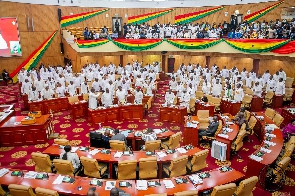Ghana’s Parliament on Tuesday (July 25) passed the Criminal Offences (Amendment), Bill, 2022, which seeks to abolish the Death Penalty.
When the President assents to the Bill, Ghana will now join the league of nations, which have replaced the Death Penalty with life imprisonment.
The object of the Private Members’ Bill is to amend the Criminal Offences Act, 1960 (Act 29) to substitute the penalty of life imprisonment for death and to provide for related matters.
The overarching objective is to reform the criminal justice system to meet the needs of emerging society and bring it in tandem with international best practices of criminal jurisprudence.
The Criminal Offences (Amendment) Bill, 2022 is being sponsored by Mr Francis-Xavier Kojo Sosu, the National Democratic Congress (NDC) Member of Parliament (MP) for Madina.
The Death Penalty, also referred to as “Capital Punishment”, is state-sanctioned execution of individuals convicted for specified offences.
In Ghana, the Death Penalty is imposed after a conviction for murder, attempt to commit murder, genocide, or piracy and smuggling of gold and diamond.
By section 304(3) of the Criminal and Other Offences (Procedure) Act, 1969 (Act30), execution of the Death Penalty may either be by hanging or shooting by firing squad.
Speaker of Parliament Alban Bagbin, who was presiding announced the Bill passed after putting the question to the vote.
During the second reading of the Bill on July 13, Mr Kwame Anyimadu-Antwi, the Chairman of the Committee on Constitutional, Legal and Parliamentary Affairs, in his report to the House, said the imposition of the Death Penalty as a punishment takes its root from the retributive theory of punishment.
The theory is premised on the principle of an “eye for an eye and a tooth for a tooth”; thus, if a person commits murder, the person must be punished in a manner proportionate to the crime of killing another person.
He said upon extensive consultations, the Committee was of the view that continuous retention of the Death Penalty in the Criminal Statutes makes a mockery of justice, and the mere fact that for almost three decades, Ghana’s Presidents had found it unnecessary to sign execution warrants was an indication that Ghana does not need the law.
Mr Francis-Xavier Kojo Sosu, the National Democratic Congress (NDC) Member of Parliament (MP) for Madina, and sponsor of Criminal Offences (Amendment), Bill, 2022, in his comment during debate on the Bill said the passage of the Bill would propel Ghana towards the fulfillment of its obligations under the international treaties and conventions.
During the debate on the Bill, Mr Cletus Apul Avoka, NDC MP for Zebilla, and Mr Habib Iddrisu, the Second Deputy Majority Whip and New Patriotic Party (NPP) MP for Tolon, both strongly opposed the abolition of the Death Penalty.
Mr Avoka in his contribution during the consideration stage indicated that the abolition of the Death Penalty could lead to mob justice.
“Where is the evidence that when the death penalty is taken out of our books, people will not commit murder? In fact, we are having fewer heinous crimes because of the existence of the death penalty,” he said.
“Already, people do not have confidence in the judicial system, and if you now go around telling people that if you kill somebody, you will not die, then you are inviting Ghanaians to take the law into their hands and do instant justice.”
He dismissed claims that there was less crime in countries which had abolished the Death Penalty.
Following the passage of the Bill, Mr Alexander Kwamina Afenyo-Markin, the Deputy Majority Leader and NPP MP for Efutu, in his address to the Parliamentary Press Corps described the Passage of the Bill as a day of victory for Ghanaians.
“Today the Parliament of Ghana has made the country proud, it has signed onto that which has become an international human rights position.
“We have had the Death Penalty in our Statues Books for well over 50 years, it’s been a concern and Parliament after deliberations and through a member of Parliament championed this private member’s Bill.
“And I am happy to say we’ve by this amendment of the parent Act been able to repeal that provision that deals with death Penalty.”
“So, simply put the Death Penalty is no more a punishment in our Statutes Books….”
General News of Tuesday, 25 July 2023
Source: GNA
Parliament repeals death penalty, replaces it with life imprisonment
Entertainment












